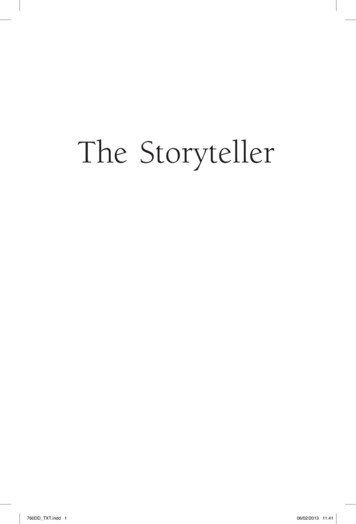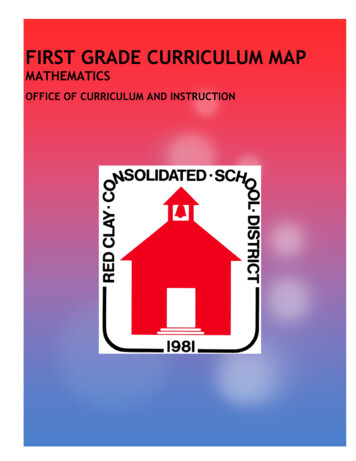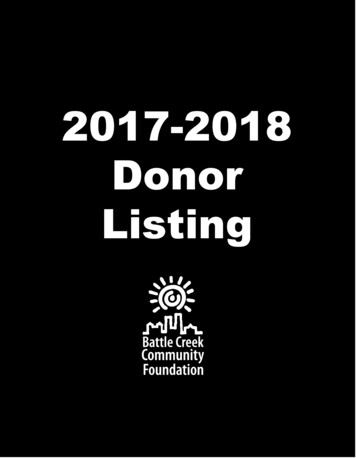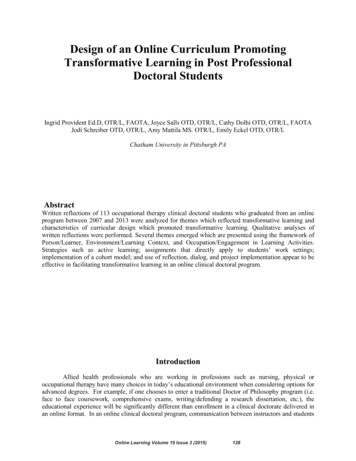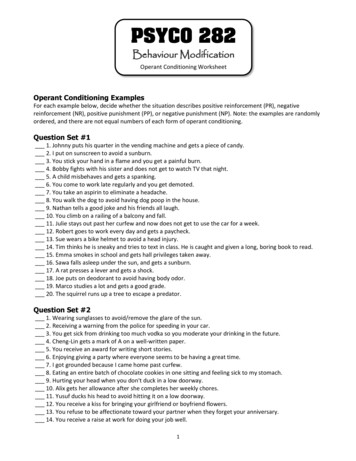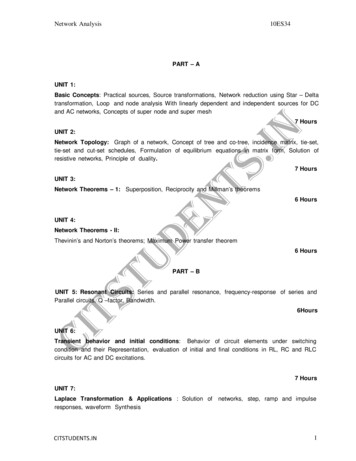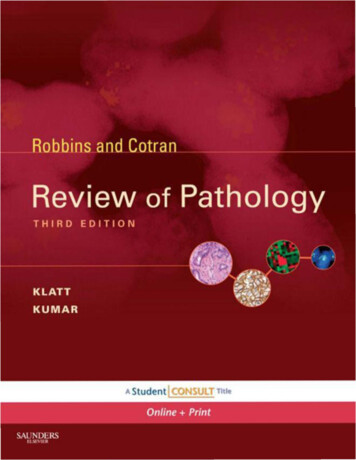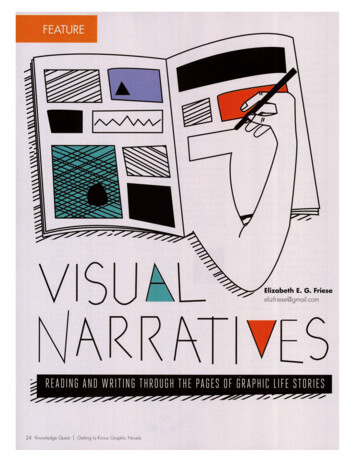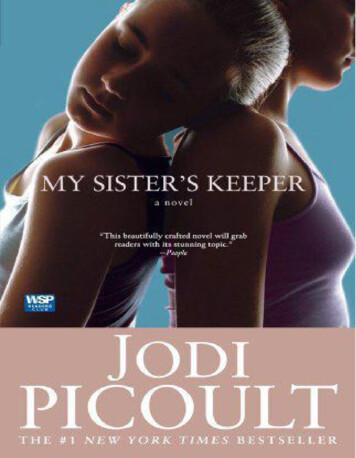
Transcription
My Sister's Keeper
My Sister's KeeperMy Sister's Keeper.htmMy Sister’s KeeperBy Jodi PicoultNo one starts a war—or rather, no one in hissense ought to do so—without first being clear inhis mind what he intends to achieve by that warand how he intends to conduct it.—CARL VON CLAUSEWITZ, VomKriegeIn my first memory, I am three years old andI am trying to kill my sister. Sometimes therecollection is so clear I can remember the itch ofthe pillowcase under my hand, the sharp point ofher nose pressing into my palm. She didn't stand achance against me, of course, but it still didn'twork. My father walked by, tucking in the housefor the night, and saved her. He led me back to
my own bed. “That,” he told me, “neverhappened.”As we got older, I didn't seem to exist,except in relation to her. I would watch her sleepacross the room from me, one long shadow linkingour beds, and I would count the ways. Poison,sprinkled on her cereal. A wicked undertow offthe beach. Lightning striking.In the end, though, I did not kill my sister.She did it all on her own.Or at least this is what I tell myself.MONDAYBrother, I am fireSurging under ocean floor.I shall never meet you, brother—Not for years, anyhow;Maybe thousands of years, brother.Then I will warm you,Hold you close, wrap you in circles,Use you and change you—Maybe thousands of years, brother.—
CARL SANDBURG, “Kin”ANNAWHEN I WAS LITTLE, the great mysteryto me wasn't how babies were made, but why.The mechanics I understood—my older brotherJesse had filled me in—although at the time I wassure he'd heard half of it wrong. Other kids myage were busy looking up the words penis andvagina in the classroom dictionary when theteacher had her back turned, but I paid attentionto different details. Like why some mothers onlyhad one child, while other families seemed tomultiply before your eyes. Or how the new girl inschool, Sedona, told anyone who'd listen that shewas named for the place where her parents werevacationing when they made her (“Good thing theyweren't staying in Jersey City,” my father used tosay).Now that I am thirteen, these distinctions areonly more complicated: the eighth-grader whodropped out of school because she got into
trouble; a neighbor who got herself pregnant in thehopes it would keep her husband from filing fordivorce. I'm telling you, if aliens landed on earthtoday and took a good hard look at why babiesget born, they'd conclude that most people havechildren by accident, or because they drink toomuch on a certain night, or because birth controlisn't one hundred percent, or for a thousand otherreasons that really aren't very flattering.On the other hand, I was born for a veryspecific purpose. I wasn't the result of a cheapbottle of wine or a full moon or the heat of themoment. I was born because a scientist managedto hook up my mother's eggs and my father'ssperm to create a specific combination of preciousgenetic material. In fact, when Jesse told me howbabies get made and I, the great disbeliever,decided to ask my parents the truth, I got morethan I bargained for. They sat me down and toldme all the usual stuff, of course—but they alsoexplained that they chose little embryonic me,specifically, because I could save my sister, Kate.
“We loved you even more,” my mother made sureto say, “because we knew what exactly we weregetting.”It made me wonder, though, what wouldhave happened if Kate had been healthy. Chancesare, I'd still be floating up in Heaven or wherever,waiting to be attached to a body to spend sometime on Earth. Certainly I would not be part of thisfamily. See, unlike the rest of the free world, Ididn't get here by accident. And if your parentshave you for a reason, then that reason betterexist. Because once it's gone, so are you.Pawnshops may be full of junk, but they'realso a breeding ground for stories, if you ask me,not that you did. What happened to make aperson trade in the Never Before Worn DiamondSolitaire? Who needed money so badly they'd sella teddy bear missing an eye? As I walk up to thecounter, I wonder if someone will look at thelocket I'm about to give up, and ask these samequestions.The man at the cash register has a nose the
shape of a turnip, and eyes sunk so deep I can'timagine how he sees well enough to go about hisbusiness. “Need something?” he asks.It's all I can do to not turn around and walkout the door, pretend I've come in by mistake.The only thing that keeps me steady is knowing Iam not the first person to stand in front of thiscounter holding the one item in the world I neverthought I'd part with.“I have something to sell,” I tell him.“Am I supposed to guess what it is?”“Oh.” Swallowing, I pull the locket out of thepocket of my jeans. The heart falls on the glasscounter in a pool of its own chain. “It's fourteenkarat gold,” I pitch. “Hardly ever worn.” This is alie; until this morning, I haven't taken it off in sevenyears. My father gave it to me when I was six afterthe bone marrow harvest, because he said anyonewho was giving her sister such a major presentdeserved one of her own. Seeing it there, on thecounter, my neck feels shivery and naked.The owner puts a loupe up to his eye, which
makes it seem almost normal size. “I'll give youtwenty.”“Dollars?”“No, pesos. What did you think?”“It's worth five times that!” I'm guessing. Theowner shrugs. “I'm not the one who needs themoney.” I pick up the locket, resigned to sealingthe deal, and the strangest thing happens—myhand, it just clamps shut like the Jaws of Life. Myface goes red with the effort to peel apart myfingers. It takes what seems like an hour for thatlocket to spill into the owner's outstretched palm.His eyes stay on my face, softer now. “Tell themyou lost it,” he offers, advice tossed in for free.If Mr. Webster had decided to put the wordfreak in his dictionary, Anna Fitzgerald would bethe best definition he could give. It's more than justthe way I look: refugee-skinny with absolutely nochest to speak of, hair the color of dirt, connectthe-dot freckles on my cheeks that, let me tell you,do not fade with lemon juice or sunscreen or even,sadly, sandpaper. No, God was obviously in some
kind of mood on my birthday, because he addedto this fabulous physical combination the biggerpicture—the household into which I was born.My parents tried to make things normal, butthat's a relative term. The truth is, I was neverreally a kid. To be honest, neither were Kate andJesse. I guess maybe my brother had his momentin the sun for the four years he was alive beforeKate got diagnosed, but ever since then, we'vebeen too busy looking over our shoulders to runheadlong into growing up. You know how mostlittle kids think they're like cartoon characters—ifan anvil drops on their heads they can peelthemselves off the sidewalk and keep going? Well,I never once believed that. How could I, when wepractically set a place for Death at the dinnertable?Kate has acute promyelocytic leukemia.Actually, that's not quite true—right now shedoesn't have it, but it's hibernating under her skinlike a bear, until it decides to roar again. She wasdiagnosed when she was two; she's sixteen now.
Molecular relapse and granulocyte and portacath—these words are part of my vocabulary, eventhough I'll never find them on any SAT. I'm anallogeneic donor—a perfect sibling match. WhenKate needs leukocytes or stem cells or bonemarrow to fool her body into thinking it's healthy,I'm the one who provides them. Nearly every timeKate's hospitalized, I wind up there, too.None of which means anything, except thatyou shouldn't believe what you hear about me,least of all that which I tell you myself.As I am coming up the stairs, my mothercomes out of her room wearing another ball gown.“Ah,” she says, turning her back to me. “Just thegirl I wanted to see.”I zip it up and watch her twirl. My mothercould be beautiful, if she were parachuted intosomeone else's life. She has long dark hair and thefine collarbones of a princess, but the corners ofher mouth turn down, like she's swallowed bitternews. She doesn't have much free time, since acalendar is something that can change drastically if
my sister develops a bruise or a nosebleed, butwhat she does have she spends at Bluefly.com,ordering ridiculously fancy evening dresses forplaces she is never going to go. “What do youthink?” she asks.The gown is all the colors of a sunset, andmade out of material that swishes when shemoves. It's strapless, what a star might wearsashaying down a red carpet—totally not thedress code for a suburban house in Upper Darby,RI. My mother twists her hair into a knot andholds it in place. On her bed are three otherdresses—one slinky and black, one buglebeaded, one that seems impossibly small. “Youlook ”Tired. The word bubbles right under my lips.My mother goes perfectly still, and I wonderif I've said it without meaning to. She holds up ahand, shushing me, her ear cocked to the opendoorway. “Did you hear that?”“Hear what?”“Kate.”
“I didn't hear anything.”But she doesn't take my word for it, becausewhen it comes to Kate she doesn't take anybody'sword for it. She marches upstairs and opens upour bedroom door to find my sister hysterical onher bed, and just like that the world collapsesagain. My father, a closet astronomer, has tried toexplain black holes to me, how they are so heavythey absorb everything, even light, right into theircenter. Moments like this are the same kind ofvacuum; no matter what you cling to, you wind upbeing sucked in.“Kate!” My mother sinks down to the floor,that stupid skirt a cloud around her. “Kate, honey,what hurts?”Kate hugs a pillow to her stomach, and tearskeep streaming down her face. Her pale hair isstuck to her face in damp streaks; her breathing'stoo tight. I stand frozen in the doorway of my ownroom, waiting for instructions: Call Daddy. Call911. Call Dr. Chance. My mother goes so far asto shake a better explanation out of Kate. “It's
Preston,” she sobs. “He's leaving Serena forgood.”That's when we notice the TV. On thescreen, a blond hottie gives a longing look to awoman crying almost as hard as my sister, andthen he slams the door. “But what hurts?” mymother asks, certain there has to be more to itthan this.“Oh my God,” Kate says, sniffling. “Do youhave any idea how much Serena and Preston havebeen through? Do you?”That fist inside me relaxes, now that I knowit's all right. Normal, in our house, is like a blankettoo short for a bed—sometimes it covers you justfine, and other times it leaves you cold andshaking; and worst of all, you never know whichof the two it's going to be. I sit down on the end ofKate's bed. Although I'm only thirteen, I'm tallerthan her and every now and then peoplemistakenly assume I'm the older sister. At differenttimes this summer she has been crazy for Callahan,Wyatt, and Liam, the male leads on this soap.
Now, I guess, it's all about Preston. “There wasthe kidnapping scare,” I volunteer. I actuallyfollowed that story line; Kate made me tape theshow during her dialysis sessions.“And the time she almost married his twin bymistake,” Kate adds.“Don't forget when he died in the boataccident. For two months, anyway.” My motherjoins the conversation, and I remember that sheused to watch this soap, too, sitting with Kate inthe hospital.For the first time, Kate seems to notice mymother's outfit. “What are you wearing?”“Oh. Something I'm sending back.” Shestands up in front of me so that I can undo herzipper. This mail-order compulsion, for any othermother, would be a wake-up call for therapy; formy mom, it would probably be considered ahealthy break. I wonder if it's putting on someoneelse's skin for a while that she likes so much, or ifit's the option of being able to send back acircumstance that just doesn't suit you. She looks
at Kate, hard. “You're sure nothing hurts?”After my mother leaves, Kate sinks a little.That's the only way to describe it—how fast colordrains from her face, how she disappears againstthe pillows. As she gets sicker, she fades a littlemore, until I am afraid one day I will wake up andnot be able to see her at all. “Move,” Kate orders.“You're blocking the picture.”So I go to sit on my own bed. “It's only thecoming attractions.”“Well, if I die tonight I want to know whatI'm missing.”I fluff my pillows up under my head. Kate, asusual, has swapped so that she has all the funchyones that don't feel like rocks under your neck.She's supposed to deserve this, because she'sthree years older than me or because she's sick orbecause the moon is in Aquarius—there's alwaysa reason. I squint at the television, wishing I couldflip through the stations, knowing I don't have aprayer. “Preston looks like he's made out ofplastic.”
“Then why did I hear you whispering hisname last night into your pillow?”“Shut up,” I say.“You shut up.” Then Kate smiles at me. “Heprobably is gay, though. Quite a waste,considering the Fitzgerald sisters are—” Wincing,she breaks off mid-sentence, and I roll towardher.“Kate?”She rubs her lower back. “It's nothing.”It's her kidneys. “Want me to get Mom?”“Not yet.” She reaches between our beds,which are just far apart enough for us to toucheach other if we both try. I hold out my hand, too.When we were little we'd make this bridge and tryto see how many Barbies we could get to balanceon it.Lately, I have been having nightmares, whereI'm cut into so many pieces that there isn't enoughof me to be put back together.My father says that a fire will burn itself out,unless you open a window and give it fuel. I
suppose that's what I'm doing, when you get rightdown to it; but then again, my dad also says thatwhen flames are licking at your heels you've got tobreak a wall or two if you want to escape. Sowhen Kate falls asleep from her meds I take theleather binder I keep between my mattress andbox spring and go into the bathroom for privacy. Iknow Kate's been snooping—I rigged up a redthread between the zipper's teeth to let me knowwho was prying into my stuff without mypermission, but even though the thread's been tornthere's nothing missing inside. I turn on the water inthe bathtub so it sounds like I'm in there for areason, and sit down on the floor to count.If you add in the twenty dollars from thepawnshop, I have 136.87. It's not going to beenough, but there's got to be a way around that.Jesse didn't have 2,900 when he bought his beatup Jeep, and the bank gave him some kind ofloan. Of course, my parents had to sign thepapers, too, and I doubt they're going to be willingto do that for me, given the circumstances. I count
the money a second time, just in case the bills havemiraculously reproduced, but math is math and thetotal stays the same. And then I read thenewspaper clippings. Campbell Alexander. It's astupid name, in my opinion. It sounds like a bardrink that costs too much, or a brokerage firm.But you can't deny the man's track record.To reach my brother's room, you actuallyhave to leave the house, which is exactly the wayhe likes it. When Jesse turned sixteen he movedinto the attic over the garage—a perfectarrangement, since he didn't want my parents tosee what he was doing and my parents didn'treally want to see. Blocking the stairs to his placeare four snow tires, a small wall of cartons, and anoak desk tipped onto its side. Sometimes I thinkJesse sets up these obstacles himself, just to makegetting to him more of a challenge.I crawl over the mess and up the stairs,which vibrate with the bass from Jesse's stereo. Ittakes nearly five whole minutes before he hearsme knocking. “What?” he snaps, opening the door
a crack. “Can I come in?”He thinks twice, then steps back to let meenter. The room is a sea of dirty clothes andmagazines and leftover Chinese take-out cartons;it smells like the sweaty tongue of a hockey skate.The only neat spot is the shelf where Jesse keepshis special collection—a Jaguar's silver mascot, aMercedes symbol, a Mustang's horse—hoodornaments that he told me he just found lyingaround, although I'm not dumb enough to believehim.Don't get me wrong—it isn't that my parentsdon't care about Jesse or whatever trouble he'sgotten himself mixed up in. It's just that they don'treally have time to care about it, because it's aproblem somewhere lower on the totem pole.Jesse ignores me, going back to whatever hewas doing on the far side of the mess. Myattention is caught by a Crock-Pot—one thatdisappeared out of the kitchen a few months ago—which now sits on top of Jesse's TV with acopper tube threaded out of its lid and down
through a plastic milk jug filled with ice, emptyinginto a glass Mason jar. Jesse may be a borderlinedelinquent, but he's brilliant. Just as I'm about totouch the contraption, Jesse turns around. “Hey!”He fairly flies over the couch to knock my handaway. “You'll screw up the condensing coil.”“Is this what I think it is?”A nasty grin itches over his face. “Dependson what you think it is.” He jimmies out the Masonjar, so that liquid drips onto the carpet. “Have ataste.”For a still made out of spit and glue, itproduces pretty potent moonshine whiskey. Aninferno races so fast through my belly and legs Ifall back onto the couch. “Disgusting,” I gasp.Jesse laughs and takes a swig, too, althoughfor him it goes down easier. “So what do youwant from me?”“How do you know I want something?”“Because no one comes up here on a socialcall,” he says, sitting on the arm of the couch.“And if it was something about Kate, you
would've already told me.”“It is about Kate. Sort of.” I press thenewspaper clippings into my brother's hand; they'lldo a better job explaining than I ever could. Hescans them, then looks me right in the eye. His arethe palest shade of silver, so surprising thatsometimes when he stares at you, you cancompletely forget what you were planning to say.“Don't mess with the system, Anna,” he saysbitterly. “We've all got our scripts down pat. Kateplays the Martyr. I'm the Lost Cause. And you,you're the Peacekeeper.”He thinks he knows me, but that goes bothways—and when it comes to friction, Jesse is anaddict. I look right at him. “Says who?”Jesse agrees to wait for me in the parking lot.It's one of the few times I can recall him doinganything I tell him to do. I walk around to the frontof the building, which has two gargoyles guardingits entrance.Campbell Alexander, Esquire's office is onthe third floor. The walls are paneled with wood
the color of a chestnut mare's coat, and when Istep onto the thick Oriental rug on the floor, mysneakers sink an inch. The secretary is wearingblack pumps so shiny I can see my own face inthem. I glance down at my cutoffs and the Kedsthat I tattooed last week with Magic Markerswhen I was bored.The secretary has perfect skin and perfecteyebrows and honeybee lips, and she's using themto scream bloody murder at whoever's on theother end of the phone. “You cannot expect me totell a judge that. Just because you don't want tohear Kleman rant and rave doesn't mean that /have to no, actually, that raise was for theexceptional job I do and the crap I put up with ona daily basis, and as a matter of fact, while we'reon—” She holds the phone away from her ear; Ican make out the buzz of disconnection.“Bastard,” she mutters, and then seems to realizeI'm standing three feet away. “Can I help you?”She looks me over from head to toe, ratingme on a general scale of first impressions, and
finding me severely lacking. I lift my chin andpretend to be far more cool than I actually am. “Ihave an appointment with Mr. Alexander. At fouro'clock.”“Your voice,” she says. “On the phone, youdidn't sound quite so ”Young?She smiles uncomfortably. “We don't tryjuvenile cases, as a rule. If you'd like I can offeryou the names of some practicing attorneys who—”I take a deep breath. “Actually,” I interrupt,“you're wrong. Smith v. Whately, Edmunds v.Womens and Infants Hospital, and Jerome v. theDiocese of Providence all involved litigants underthe age of eighteen. All three resulted in verdictsfor Mr. Alexander's clients. And those were just inthe past year.”The secretary blinks at me. Then a slowsmile toasts her face, as if she's decided she justmight like me after all. “Come to think of it, whydon't you just wait in his office?” she suggests, and
she stands up to show me the way.Even if I spend every minute of the rest of mylife reading, I do not believe that I will evermanage to consume the sheer number of wordsrouted high and low on the walls of CampbellAlexander, Esquire's office. I do the math—ifthere are 400 words or so on every page, andeach of those legal books are 400 pages, andthere are twenty on a shelf and six shelves perbookcase—why, you're pushing nineteen millionwords, and that's only partway across the room.I'm alone in the office long enough to notethat his desk is so neat, you could play Chinesefootball on the blotter; that there is not a singlephoto of a wife or a kid or even himself; and thatin spite of the fact that the room is spotless, there'sa mug full of water sitting on the floor.I find myself making up explanations: it's aswimming pool for an army of ants. It's some kindof primitive humidifier. It's a mirage.I've nearly convinced myself about that lastone, and am leaning over to touch it to see if it's
real, when the door bursts open. I practically fallout of my chair and that puts me eye to eye withan incoming German shepherd, which spears mewith a look and then marches over to the mug andstarts to drink.Campbell Alexander comes in, too. He's gotblack hair and he's at least as tall as my dad—sixfeet—with a right-angle jaw and eyes that lookfrozen over. He shrugs out of a suit jacket andhangs it neatly on the back of the door, then yanksa file out of a cabinet before moving to his desk.He never makes eye contact with me, but he startstalking all the same. “I don't want any Girl Scoutcookies,” Campbell Alexander says. “Althoughyou do get Brownie points for tenacity. Ha.” Hesmiles at his own joke.“I'm not selling anything.”He glances at me curiously, then pushes abutton on his phone. “Kerri,” he says when thesecretary answers. “What is this doing in myoffice?”“I'm here to retain you,” I say.
The lawyer releases the intercom button. “Idon't think so.”“You don't even know if I have a case.”I take a step forward; so does the dog. Forthe first time I realize it's wearing one of thosevests with a red cross on it, like a St. Bernard thatmight carry rum up a snowy mountain. Iautomatically reach out to pet him. “Don't,”Alexander says. “Judge is a service dog.”My hand goes back to my side. “But youaren't blind.”“Thank you for pointing that out to me.”“So what's the matter with you?”The minute I say it, I want to take it back.Haven't I watched Kate field this question fromhundreds of rude people?“I have an iron lung,” Campbell Alexandersays curtly, “and the dog keeps me from gettingtoo close to magnets. Now, if you'd do me theexalted honor of leaving, my secretary can findyou the name of someone who—”But I can't go yet. “Did you really sue God?”
I take out all the newspaper clippings, smooththem on the bare desk.A muscle tics in his cheek, and then he picksup the article lying on top. “I sued the Diocese ofProvidence, on behalf of a kid in one of theirorphanages who needed an experimentaltreatment involving fetal tissue, which they feltviolated Vatican II. However, it makes a muchbetter headline to say that a nine-year-old is suingGod for being stuck with the short end of thestraw in life.” I just stare at him. “Dylan Jerome,”the lawyer admits, “wanted to sue God for notcaring enough about him.”A rainbow might as well have cracked downthe middle of that big mahogany desk. “Mr.Alexander,” I say, “my sister has leukemia.”“I'm sorry to hear that. But even if I werewilling to litigate against God again, which I'm not,you can't bring a lawsuit on someone else'sbehalf.”There is way too much to explain—my ownblood seeping into my sister's veins; the nurses
holding me down to stick me for white cells Katemight borrow; the doctor saying they didn't getenough the first time around. The bruises and thedeep bone ache after I gave up my marrow; theshots that sparked more stem cells in me, so thatthere'd be extra for my sister. The fact that I'm notsick, but I might as well be. The fact that the onlyreason I was born was as a harvest crop for Kate.The fact that even now, a major decision about meis being made, and no one's bothered to ask theone person who most deserves it to speak heropinion.There's way too much to explain, and so I dothe best I can. “It's not God. Just my parents,” Isay. “I want to sue them for the rights to my ownbody.”CAMPBELLWHEN YOU ONLY HAVE A HAMMER,everything looks like a nail.This is something my father, the firstCampbell Alexander, used to say; it is also in my
opinion the cornerstone of the American civiljustice system. Simply put, people who have beenbacked into a corner will do anything to fight theirway to the center again. For some, this meansthrowing punches. For others, it means instigatinga lawsuit. And for that, I'm especially grateful.On the periphery of my desk Kerri hasarranged my messages the way I prefer—urgentones written on green Post-its, less pressingmatters on yellow ones, lined up in neat columnslike a double game of solitaire. One phone numbercatches my eye, and I frown, moving the greenPost-it to the yellow side instead. Your mothercalled four times!!! Kerri has written. On secondthought, I rip the Post-it in half and send it sailinginto the trash.The girl sitting across from me waits for ananswer, one I'm deliberately withholding. She saysshe wants to sue her parents, like every otherteenager on the planet. But she wants to sue forthe rights to her own body. It is exactly the kind ofcase I avoid like the Black Plague—one which
requires far too much effort and client baby-sitting.With a sigh, I get up. “What did you say yourname was?”“I didn't.” She sits a little straighter. “It'sAnna Fitzgerald.”I open the door and bellow for my secretary.“Kerri! Can you get the Planned Parenthoodnumber for Ms. Fitzgerald?”“What?” When I turn around, the kid isstanding. “Planned Parenthood?”“Look, Anna, here's a little advice. Instigatinga lawsuit because your parents won't let you getbirth control pills or go to an abortion clinic is likeusing a sledgehammer to kill a mosquito. You cansave your allowance money and go to PlannedParenthood; they're far better equipped to dealwith your problem.”For the first time since I've entered my office,I really, truly look at her. Anger glows around thiskid like electricity. “My sister is dying, and mymother wants me to donate one of my kidneys toher,” she says hotly. “Somehow I don't think a
handful of free condoms is going to take care ofthat.”You know how every now and then, youhave a moment where your whole life stretches outahead of you like a forked road, and even as youchoose one gritty path you've got your eyes on theother the whole time, certain that you're making amistake? Kerri approaches, holding out a strip ofpaper with the number I've asked for, but I closethe door without taking it and walk back to mydesk. “No one can make you donate an organ ifyou don't want to.”“Oh, really?” She leans forward, counting offon her fingers. “The first time I gave something tomy sister, it was cord blood, and I was anewborn. She has leukemia—APL—and my cellsput her into remission. The next time she relapsed,I was five and I had lymphocytes drawn from me,three times over, because the doctors neverseemed to get enough of them the first timearound. When that stopped working, they tookbone marrow for a transplant. When Kate got
infections, I had to donate granulocytes. When sherelapsed again, I had to donate peripheral bloodstem cells.”This girl's medical vocabulary would putsome of my paid experts to shame. I pull a legalpad out of a drawer. “Obviously, you've agreed tobe a donor for your sister before.”She hesitates, then shakes her head.“Nobody ever asked.”“Did you tell your parents you don't want todonate a kidney?”“They don't listen to me.”“They might, if you mentioned this.”She looks down, so that her hair covers herface. “They don't really pay attention to me,except when they need my blood or something. Iwouldn't even be alive, if it wasn't for Kate beingsick.”An heir and a spare: this was a custom thatwent back to my ancestors in England. It soundedcallous—having a subsequent child just in case thefirst one happens to die—yet it had been eminently
practical once. Being an afterthought might not sitwell with this kid, but the truth is that children areconceived for less than admirable reasons everysingle day: to glue a bad marriage together; tokeep the family name alive; to mold in a parent'sown image. “They had me so that I could saveKate,” the girl explains. “They went to specialdoctors and everything, and picked the embryothat would be a perfect genetic match.”There had been ethics courses in law school,but they were generally regarded as either a gut oran oxymoron, and I usually skipped them. Still,anyone who tuned in periodically to CNN wouldknow about the controversies of stem cellresearch. Spare-parts babies, designer infants, thescience of tomorrow to save the children of today.I tap my pen on the desk, and Judge—mydog—sidles closer. “What happens if you don'tgive your sister a kidney?”“She'll die.”“And you're okay with that?”Anna's mouth sets in a thin line. “I'm here,
aren't I?”“Yes, you are. I'm just trying to figure outwhat made you want to put your foot down, afterall this time.”She looks over at the bookshelf. “Because,”she says simply, “it never stops.”Suddenly, something seems to jog hermemory. She reaches into her pocket and puts awad of crumpled bills and change onto my desk.“You don't have to worry about getting paid,either. That's 136.87. I know it's not enough, butI'll figure out a way to get more.
By Jodi Picoult No one starts a war—or rather, no one in his sense ought to do so—without first being clear in his mind what he intends to achieve by that war and how he intends to conduct it. —CARL VON CLAUSEWITZ, Vom Kriege In my first memory, I am three years old and I am trying to kill my sister. Sometimes theFile Size: 1MBPage Count: 713Explore furtherMY SISTERS KEEPER TEXT - Jodi Picoultjodipicoult.com.aufree children's story books pdf free kids story books .monkeypen.comShort Story Downloads - Middle School Englishsites.google.comread aloud books for 5-7 year old girls (243 books)www.goodreads.comFree PDF Books Download, Online e Books for Childrenwww.kidsworldfun.comRecommended to you b
